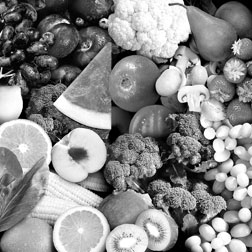Massive improvements in agriculture planned
Twenty five thousand hectares of herbal farms will be established in
the North and East under the Ministry of Indigenous Medicine.
In addition 20,000 hectares of land will be cultivated with ginger,
tumeric and citronella in Ampara, Kilinochchi, Hambantota and
Trincomalee districts. Approximately 0.2 mln hectares of land will be
cultivated with pulses, tubers and cereals countrywide.
Plans are afoot to make the country one of the best quality
production centres for floriculture products in the world. In cut flower
production high quality new hybrid varieties imported will be used as
mother plants and a number of nurseries will be modernised with tissue
culture apparatus.
 Around 1500 floriculture villages will be established in the Western,
North Western and Central provinces. 30,000 jobs will be generated in
rural and suburban areas. With this the share of exports of cut flowers
and foliage will increase significantly during the decade. Around 1500 floriculture villages will be established in the Western,
North Western and Central provinces. 30,000 jobs will be generated in
rural and suburban areas. With this the share of exports of cut flowers
and foliage will increase significantly during the decade.
Government seed farms at Kundasale, Aluththarama, Malwatta,
Karadiyanaru, Kantalai, Maha Illuppallama, Peedru, Kandapola,
Meepilimana, Udaradella, Rahangala, Polonnaruwa, Paranthan and Jaffna
will be developed with modern technology with plans to increase the
yield. Buffer stocks of certified seeds will be maintained ensuring an
uninterrupted supply of seeds, said a report issued by the Finance and
Planning Ministry.
There is also a necessity for developing a competitive and regulated
seed industry by involving the private sector in seed production and
distribution. Strict quarantine regulations will be in place when
importing seeds by enacting the Seed Act to protect and safeguard
domestic agriculture.
The traditional role of bank credit in agriculture to fund seasonal
production will be reversed with the budgetary decision of 10 percent
mandatory lending to the agriculture sector by commercial banks.
The Central Bank will also promote refinance schemes to support
agriculture development in several districts. To further strengthen this
sector new credit schemes will be introduced to the farmers in addition
to the 10 percent mandatory lending requirement.
Research and development relating to agriculture will be expanded
from problem identification and productivity improvement in the sector.
Research institutes will be developed providing infrastructure
facilities and new technological equipment.
Human resources will also be developed and strengthened by linking
the knowledge hubs. Extension approaches will be developed using social
marketing concepts to add value through ICT.
In addition awareness programs will be developed to disseminate
research findings among farmers and the potential farmer community.
Agro tourism will be popularised among tourists while visitors will
be given the opportunity to harvest and taste fresh fruits, vegetables
and paddy inside the farm. Large scale orchards with entertainment
facilities for relaxation and enjoyment will be established at locations
where tourists are attracted.
The price for fertiliser is high in the international market. The
import of fertiliser creates an unnecessary pressure on the BOP.
Therefore, locally manufactured fertiliser using Eppawala rock phosphate
will be promoted.
The government plans to popularise fruit juices instead of carbonated
soft drinks. Modern fruit processing factories will be set up in
Gampaha, Anuradhapura, Polonnaruwa, Hambantota, Badulla, Kilinochchi,
Kandy and Kalutara. Bottled tropical fruits and vegetables will be
exported in different forms.
SG
|

